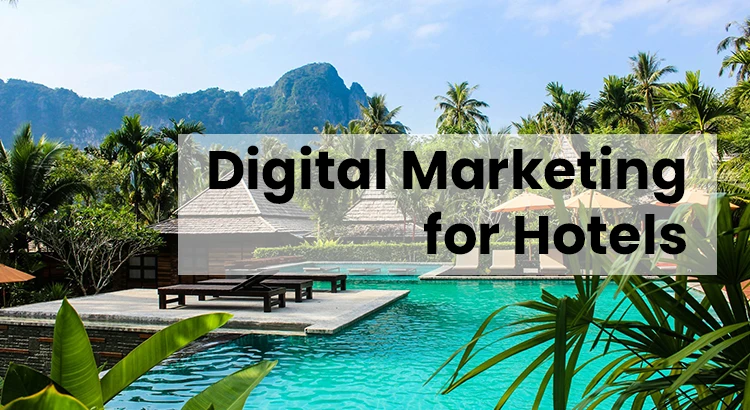Hotels must leverage innovative promotional techniques to attract potential guests. Digital marketing for hotels offers a range of strategies tailored to meet the unique needs of the hospitality industry. By utilizing these strategies, hotels can enhance visibility, improve guest engagement, and ultimately drive bookings.
Importance of Hotel Digital Marketing
Online promotion is important as it aligns with current trends in consumer behavior. With over 55% of hotel bookings made online, having a strong digital presence is essential. Many travelers now research and book accommodations via mobile devices.
If hospitality brands lack visibility on the internet, they risk losing potential customers to competitors who actively engage online. In a competitive market, effective digital marketing solutions ensure that establishments can showcase their offerings and attract a broader audience.
Online Marketing Strategy for Hotels
Here is the list of the top 11 strategies:
1. List Your Hotel on Google
Getting your hotel listed on Google Business Profile is essential for visibility. This free tool allows you to provide essential information, such as location, contact details, and hours of operation. A well-optimized listing increases your chances of appearing in local search results, helping potential customers find you easily.
2. Have a User-Friendly Website
A professional, user-friendly website is the foundation of your online presence. It should showcase your hotel’s amenities, rooms, and services while providing an intuitive booking experience. A well-designed website not only attracts visitors but also encourages them to book directly, minimizing third-party commission costs.
3. SEO: The Backbone of Websites
Search engine optimization is important for improving your hotel’s online visibility. By incorporating relevant keywords, optimizing site speed, and creating quality content, you can enhance your ranking on search engine results pages. This increased visibility attracts more organic traffic and potential customers to your website.
4. Ads, Ads, and More Ads!
Investing in paid advertising, including pay-per-click (PPC) and display ads, allows you to target specific audiences actively searching for accommodations. These ads can drive immediate traffic to your website and generate leads. Effective ad campaigns can increase brand awareness and conversion rates.
5. Social Media Engagement
Utilizing social media platforms such as Instagram and Facebook helps hospitality businesses connect with potential guests on a personal level. Share high-quality images, engage with followers, and promote special offers to foster community. Social media can help build brand loyalty and encourage direct bookings.
6. Tell Your Story Through Video
Video marketing is an engaging way to showcase your hotel’s unique features and local attractions. Create promotional videos that highlight guest experiences, amenities, and nearby points of interest. Videos can evoke emotions and create a connection with potential customers, increasing the likelihood of bookings.
7. Don’t Forget Email Marketing
Email campaign is an effective tool for staying connected with past and potential guests. Regular newsletters featuring promotions, events, and personalized offers keep your hotel top-of-mind. This strategy not only encourages repeat bookings but also builds a loyal customer base.
8. Take Advantage of Influencer Partnerships
Partnering with travel influencers can expand your hotel’s reach significantly. Influencers can showcase their experiences at your property to their followers, generating interest and trust. This word-of-mouth marketing can lead to increased visibility and bookings from a targeted audience.
9. Informative Blogging
A well-maintained blog can position your hotel as a knowledgeable authority in the travel industry. Share valuable content, such as travel tips, local attractions, and hotel updates. This not only boosts SEO but also engages your audience, driving traffic to your website and increasing bookings.
10. Chatbot Assistance
Implementing chatbots on your website enhances customer service by providing instant responses to inquiries. This technology improves user experience, ensuring potential guests receive quick answers to their questions. By streamlining communication, chatbots can increase the likelihood of converting inquiries into bookings.
11. Maintain Your Online Reputation
Regularly monitor reviews and feedback on platforms like TripAdvisor and Google. Responding to both positive and negative reviews demonstrates excellent customer service and helps build trust with potential customers. A strong online reputation is crucial for attracting new customers and encouraging repeat business.
Summary
Utilizing effective strategies is essential for hospitality businesses to thrive in a competitive market. By enhancing online visibility and fostering engagement, businesses can connect with potential guests and drive more bookings. In a world increasingly reliant on digital interaction, a strong online presence can set your hotel apart.
